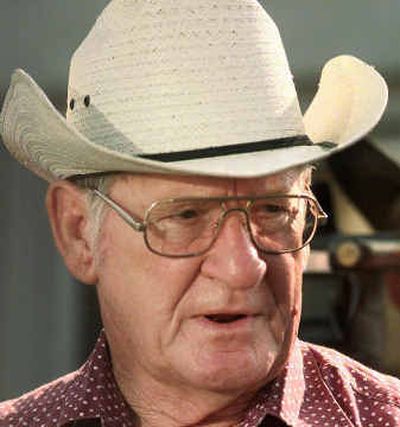In passing

Bobby Frank Cherry, Baptist church bomber
Montgomery, Ala. Bobby Frank Cherry, convicted of killing four black girls in a racially motivated bombing of a Birmingham church in 1963, died Thursday in prison. He was 74.
Cherry died in the hospital unit at Kilby Correctional Facility, a Department of Corrections spokesman said.
Cherry was convicted in May 2002 in the bombing of the Sixteenth Street Baptist Church, a gathering place for civil rights demonstrators in Birmingham, and was sentenced to life in prison. It was the deadliest act of the civil rights era.
Cherry was among three former Ku Klux Klan members convicted in the bombing, which killed the four girls as they were preparing to take part in a Sunday morning service.
Thomas Blanton was convicted in 2001 and is serving a life prison sentence. Robert Chambliss, convicted in 1977, also died in prison.
The Sept. 15, 1963, explosion killed Addie Mae Collins, Carole Robertson and Cynthia Wesley, all 14, and Denise McNair, 11.
While Cherry, Blanton and Chambliss were all considered suspects within days, the case went unsolved for years until then-Alabama Attorney General Bill Baxley reopened the investigation and prosecuted Chambliss in 1977.
Cherry and Blanton were prosecuted years later after new evidence, including FBI files, became available.
Cherry was convicted May 22, 2002, by a jury of nine whites and three blacks after prosecutors painted him as a staunch segregationist who was upset about school integration.
Jasper Herber Kane, antibiotic manufacturer
Boca Raton, Fla. Jasper Herbert Kane, a biochemist who suggested that antibiotics could be manufactured in mass quantities rather than dose-by-dose in a laboratory, died Tuesday, according to his alma mater, the Polytechnic University in New York City. He was 101.
Born in Brooklyn, N.Y., Kane was a teenager when he began working as an assistant at the Chas. Pfizer & Co. chemical manufacturing plant there. He studied nights at the Polytechnic Institute, also in Brooklyn, and graduated in 1928.
He continued working for Pfizer and in 1942 suggested using a fermentation process to mass-manufacture penicillin, streptomycin and other antibiotics. The idea helped steer Pfizer, at the time a chemical supplier for the food industry, toward pharmaceutical production.
Kane eventually became Pfizer’s vice president and director of biochemical research and development. He retired in 1953.
Terry Melcher, record producer, songwriter
Beverly Hills, Calif. Terry Melcher, a record producer and songwriter who aided the careers of Ry Cooder, the Byrds and the Beach Boys, died Friday of melanoma, his publicist said. He was 62.
Melcher, the son of actress Doris Day, co-wrote the hit song “Kokomo” for the Beach Boys. The song was used in the movie “Cocktail” and was nominated for a Golden Globe in 1988 for best original song. He also performed on the Beach Boys album “Pet Sounds.”
In the early 1960s, Melcher began singing as a solo act and later paired with future Beach Boy Bruce Johnston to form the group Bruce & Terry. The pair had several hits, then went on to form the Rip Chords, which recorded the 1964 hit “Hey, Little Cobra.”
In the mid-1960s, Melcher joined Columbia Records as a producer. Working with the Byrds, he produced their top-selling version of Bob Dylan’s “Mr. Tambourine Man” and other hits, including “Turn, Turn, Turn.”
Melcher also produced hit songs for Paul Revere and the Raiders and worked with Gram Parsons, the Mamas and the Papas, and Ry Cooder.
He served as the executive producer of his mother’s CBS show “The Doris Day Show” from 1968 to 1972 and co-produced her mid-1980s show, “Doris Day’s Best Friends.”
Melcher also helped run his mother’s charitable activities, including the Doris Day Animal Foundation.
Norman Rose, actor, ‘the Voice of God’
Norman Rose, an eclectic actor whose face was less recognizable than his room-filling baritone, which prompted colleagues to dub him “the Voice of God,” has died. He was 87.
The actor, who was the voice of God in Woody Allen’s 1975 motion picture, “Love and Death,” began performing as a student at George Washington University in Washington, D.C., and worked steadily on stage, screen, television and radio for the next 65 years.
He performed on Broadway in “Richard III” and “St. Joan,” and off-Broadway in “The Brothers Karamazov.” In movies, he was Allen’s lawyer in “The Front” and Sean Connery’s robbery victim in “The Anderson Tapes.” On television he played the psychiatrist Dr. Marcus Polk in the soap operas “One Life to Live” and “All My Children.”
But despite his capabilities in visible roles, Rose proved most in demand for his stentorian voice. He was hired to speak for fictional serape-clad Juan Valdez, promising “only the ripest beans” over a decade of Colombian coffee commercials. Most media credits listed his role as simply “the narrator.”
On radio, Rose narrated “The Greatest Story Ever Told” and NBC dramas such as Ray Bradbury’s “The Martian Chronicles.” His voice led listeners through Studio One’s early television saga “The Night America Trembled,” and years later introduced such specials as Tolstoy’s “War and Peace” and Mikhail Baryshnikov’s annual production of “The Nutcracker.”
Rose was the opening narrator of the film “Message From Space: Galactic Wars” and played a newsreel announcer in the motion picture version of “Biloxi Blues.”